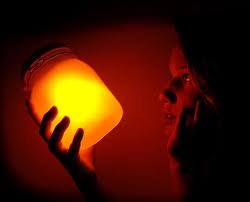-
(单词翻译:双击或拖选)
Afterglow
Here’s an experiment you can try: look at something bright relative to its surroundings, such as a lamp or a sunny window, for ten seconds without blinking. Then shut your eyes and cover them over with your hands.
You will find that the lamp or window still seem to be hovering in front of you, quite visible at first and only gradually fading away. Yet your eyes are closed and your hands are blocking them completely — so where is the light coming from?
The answer is that the afterglow light you see isn’t really light at all. It’s the result of residual activity of the nerve cells on the back of your eye, called the retina. In sensory1 psychology2 this effect is called a “positive afterimage.”
You can think of it as something like the vibration of a string after it has been struck. The player’s finger is taken away, and yet the sound continues, because the energy she or he put into the string takes a little while to dissipate.
It’s a similar situation with your eyes. In order to respond usefully to such a relatively faint signal as light, the cells in the retina need to be very sensitive. Over-stimulate them and some will continue responding for a couple of seconds after the stimulus3 is removed.
Of course, the only thing we ever “see,” really, is the activation4 of our retinal cells — that’s what our brains interpret as light from the outside world. So for as long as it takes for them to calm down, you will continue to see a faint glow of light — even though nothing is there.
你可以尝试这样的试验:不眨眼盯着看相对周围而言光亮的东西十秒钟,比如,一盏灯或洒满阳光的窗户;接着闭上眼睛且双手蒙住。
你会发现那盏灯或窗户依旧浮现在眼前,最开始清晰得很,又慢慢消失。可是,你不是闭眼了吗?况且双手不是严实地蒙住了吗?那么,光线从何而来?
答案是残留的余光根本不是真正的光芒。其实这是视网膜(眼后的神经细胞)的痕迹作用。感官心理学将这种现象称作“正后像”。
你可以将“正后像”视为拨动后琴弦的振动。弹琴者手指离开了琴,而琴音依旧。因为琴弦上的能量需要点时间消退。
视觉的情况也类似,视网膜细胞的感光十分敏感以便及时感知像光线般微弱的信号。受到过度刺激的视网膜细胞,部分在刺激后持续反应。
当然,唯一我们“看到”的是视网膜细胞的激活也就是大脑解读的:外界的光线。所以,只要刺激后需要时间平复,你就能持续看到微弱的灯光,虽然,实际上并不存在。
 收听单词发音
收听单词发音
1
sensory

|
|
| adj.知觉的,感觉的,知觉器官的 | |
参考例句: |
|
|
|
2
psychology

|
|
| n.心理,心理学,心理状态 | |
参考例句: |
|
|
|
3
stimulus

|
|
| n.刺激,刺激物,促进因素,引起兴奋的事物 | |
参考例句: |
|
|
|
4
activation

|
|
| n. 激活,催化作用 | |
参考例句: |
|
|
|


















